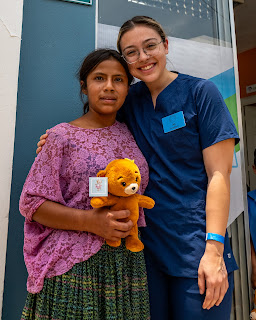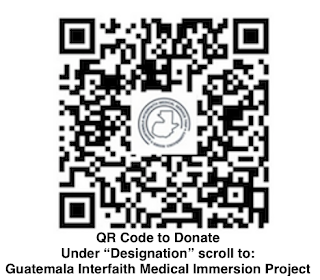Translation Train: Pediatrics in Guatemala
Throughout the school year, Dr. Lauri Pramuk educated us students on the importance of pediatric medicine everywhere, but especially in struggling communities like Cobán, Guatemala. We also were educated on the Mayan communities that were oppressed for many years in Guatemala and how they live today. For the first day in Ciudad de la Esperanza, I had the privilege of starting with Dr. Lauri for her Mayan-Guatemalan pediatric patients.
The first case of the day was 11-month-old Kimberly. Kimberly was brought in by her K'iche' speaking mother who wanted to ask about potential surgery to correct her Syndactyly. Kimberly had her index, middle, and ring fingers fused on her left hand and her right foot had misshapen toes. Dr. Lauri immediately dived into a medical history to ask if Kimberly was prematurely born, if it was a healthy pregnancy, other medical issues, mother and Kimberly’s diet, and more. The mother informed us that Kimberly was a late c-section baby from a healthy pregnancy, was constipated, and only had breast milk. Kimberly’s mother also told us she did not have access to clean water and had to buy bottles which was expensive. After examination and physical therapy, Dr. Lauri and Dr. Deb both concluded that Kimberly was not disabled, but different abled with lack of opportunity. Both Dr. Lauri and Dr. Deb explained to the mother the importance of independence in young children, so they can learn how to crawl, walk, talk, etc. This is because Kimberly’s mother would hold her day and night to show her affection, yet it did not allow ample time for Kimberly to experiment with crawling or cruising. Lastly, Dr. Lauri gave Kimberly’s mother a baby kit with many necessities that will be helpful in Kimberly’s independence journey, as well as an ecofiltero to allow for easier access to clean water.
The last patients of my morning rotation in pediatrics were with three K'iche' speaking orphans brought in by their caring neighbor, the mayor of their area, their grandma, and older sister. The children were Ingrid, Jenifer, and Hamilton; all elementary school age. These young kids had unfortunately lost their parents to unknown causes within two years of each other, had no access to clean water, were not educated on dental hygiene, and never had seen a doctor before in their lives. Yet, these children were smiling and laughing every second they were in the clinic. They were confused on what was happening, but they knew we were there to help them feel better, so they were excited whether they understood the foreign phrases or not. This family was overall healthy, but we did give Ingrid ibuprofen for her dehydration headaches and feminine hygiene products. We also gave the three kids and grandma multivitamins, along with an ecofiltero for clean water.
These two visits posed its own unique challenge due to the “translation train” that we had to go through to get a medical history, give an examination, and administer treatment. Dr. Lauri would ask a question in English, our English-Spanish translator (Diana) would ask the question in Spanish, then the Spanish-K'iche' would ask the family in K'iche', finally the answer would be reverberated through the train again until it reached Dr. Lauri. Throughout the visit, I could not help but think of the possibility of important information being translated incorrectly or being lost along the translation train. After their visits, I gave the Kimberly, Ingrid, Jenifer, and Hamilton all a teddy bears each to take home, a simple gift to Americans. But to them, it was as if I gave them the world. They were so excited for such a small gift. I do not think I will ever see a bigger smile, louder giggle, or receive a tighter and more heartfelt hug. These children touched my heart in an ineffable way with their love, compassion, thankfulness, and goofy personalities. The Mayan community has endured so much trauma and marginalization through time, so seeing some of the few Mayan families today to listen to their stories and see their troubles was eye opening. It allowed for me to be more grateful in my ability to virtually anything in the United States since we have easier access to resources to flourish. As I reflect on my experiences in pediatric medicine in Cobán, Guatemala, I am reminded of the resilience and joy exhibited by children like Kimberly, Ingrid, Jenifer, and Hamilton, whose stories and laughter left an indelible mark on my heart that I will hold onto for the rest of my life.
-AJ Calderon





Comments
Post a Comment